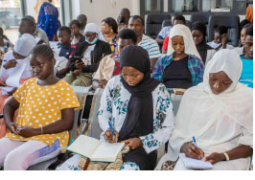
However, there are growing concerns about access to quality education, gainful employment, and a decent standard of living.
This proportion is very low; the analogous rate for Nigerian students was 76.36%. Almost 37% of young people are not in education, employment, or training (NEET).
The youth labour force participation rate is low at 35% compared to 62.1% of ages 35-64. The challenges are numerous, multi-faceted, and require attention.
The World Bank’s Human Capital Review (HCR) for The Gambia, provides an overview of human capital challenges and opportunities across the lifecycle and offers a cross-sectoral approach towards greater prosperity.
The report conducts a deep dive on youth1 and engaged 250 young people across the country on the themes of education, employment, migration, and perceptions of the future.
Youth value education but are concerned about quality and accessibility. Non-attendance can be driven by lack of accessibility and family circumstances, especially for girls.
A female focus group discussant in Banjul argued: “Some students are removed from school; some are asked to stop by their husband or families because their culture values marriage more than education.”
Similarly, some children drop out of school because their families cannot afford uniforms and books, although basic education is free in public schools.
Technical and vocational education and training (TVET) can provide young people with practical skills for employment but need to be designed to meet employers’ demands: “TVETs are the future; we need more people with practical skills. We also need to make sure that the curriculums of these TVETs are aligned with the market needs.”
However, TVET centres only serve a small segment of the youth and are often times inaccessible due to geographic distance and cost.
Read Other Articles In Youth Forum




